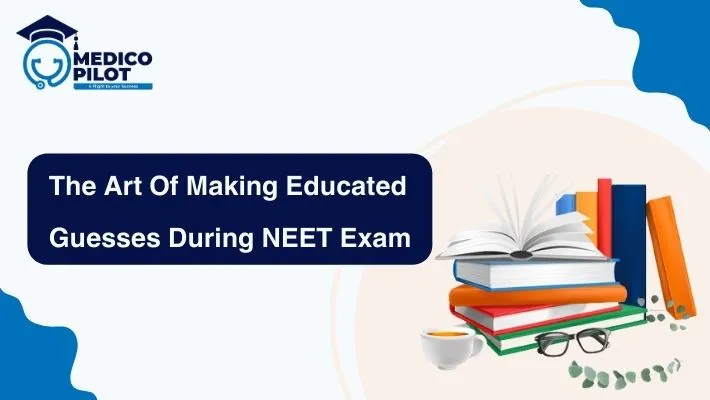
The Art of Making Educated Guesses During NEET Exam
The National Eligibility cum Entrance Test (NEET) is an important medical entrance exam in India. Candidates frequently encounter challenging questions or are unsure about the answer with limited time during the exam. While it’s crucial to answer questions accurately, mastering the art of guesswork can be a valuable skill during the NEET exam. In order to increase your chances of doing well on the exam, we will look at ways in this article for making informed predictions and using guessing effectively.
1.Understanding the scoring process: Understanding the NEET exam scoring methodology is crucial before diving into speculation strategies. NEET exam follows a +4, -1 pattern, where candidates receive four marks for each correct answer and one mark is deducted for each incorrect answer. No points are deducted for unanswered questions. Candidates can perform better during guesses if they keep this in mind.
2.Process of Elimination: During the NEET exam, start by eliminating the options that are clearly incorrect. This can significantly increase your chances of guessing correctly. Look for keywords or phrases in the question that can help you eliminate choices. For example, if a question asks about a specific biological process, eliminate options related to unrelated processes.
3.Prioritize Familiar Topics: If you’re faced with a question in an area you’re not very confident in, consider guessing in areas where you have a better understanding. It involves using your knowledge and logical reasoning to make an informed choice. If you have some familiarity with the topic or can recall related information, it’s worth making an educated guess rather than blindly picking an option. Allocate your time and energy wisely.
4.Use Context Clues: While making guesses during the NEET exam, pay attention to keywords or clues in the question that may hint at the correct answer. Sometimes, the surrounding information can also provide hints about the correct answer. Certain keywords might lead you to the right choice, especially when you have some knowledge about the topic but not a complete understanding.
5.Analyze Patterns: In some multiple-choice exams, there may be patterns or trends in the answer choices. For example, if you notice that the correct answer has been mostly “B” for the last few questions, it might be a good idea to guess “B” if you’re unsure.
6.Partial Knowledge: If you have partial knowledge or can eliminate some choices based on your understanding, make an educated guess. Even if you’re not sure of the complete answer, you might still get it right.
7.Educated Guessing Techniques: In the NEET exam, if you can narrow down the answer choices to two options, consider using a 50/50 guess. This gives you a 50% chance of getting it right, compared to a 25% chance with four options. If there is an “all of the above” or “none of the above” option, these tend to be correct more often than not. Use this information to your advantage when making a guess.
8.Guessing on Numerical Questions: When dealing with numerical questions during the NEET exam, assess the options provided. When choosing an option, make sure that words like “always,” “never,” “all,” or “none” appropriately represent the circumstance. More moderate choices often have a higher chance of being accurate.
9.Beware of Extreme Statements: In multiple-choice questions, extreme statements are often incorrect. Only select options if you are certain that phrases like “always,” “never,” “all,” or “none” accurately describe the situation. Options that are more moderate typically have a better likelihood of being accurate.
10.Rule Out Similar-Sounding Options: In language-related questions, candidates may come across options that sound similar. Pay attention to slight differences in wording, grammar, or context. Often, the correct answer will have the most precise and accurate phrasing.
11.Avoid Random Guessing: In the NEET exam, guesswork can be valuable, random guessing is not advisable. Blindly selecting an option without any logical reasoning is likely to result in negative marking, reducing your overall score. Reserve guesswork for questions where you can eliminate some options or make educated guesses.
12.Time Management: Don’t spend too much time on a single question if you’re unsure. Mark it for review and come back to it later after answering other questions you are more confident about.
13.Stay Calm and Focused: Stress and anxiety can affect your ability to make educated guesses. Take deep breaths, stay calm, and maintain your focus during the NEET exam.
14.Educate Yourself on Exam Patterns: Familiarize yourself with the format and patterns of previous NEET exam. Understanding the typical question style and distribution of topics can help you make more informed guesses.
15.Practice: Regular practice with sample papers and mock tests can help you improve your ability to make educated guesses. Analyze your mistakes and learn from them.
Remember that educated guessing during the NEET exam should be a last resort. Always strive to answer questions accurately based on your knowledge and understanding of the subject matter. However, when you’re unsure, these strategies can increase your chances of making the right guess.
